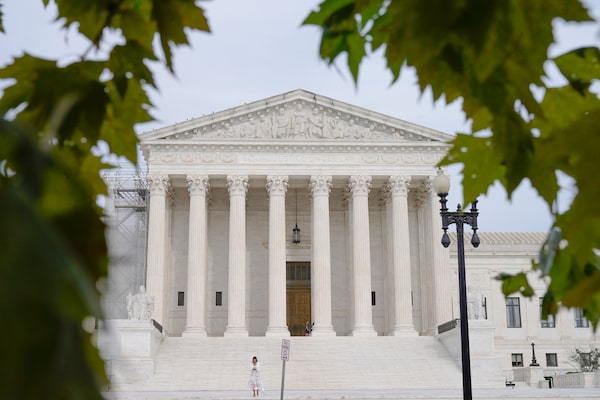
The U.S. Supreme Court on Aug 30, in Washington. The new term of the high court begins on Oct. 2.Mariam Zuhaib/The Associated Press
Monday marks the first day of the U.S. Supreme Court’s new term as it prepares to tackle major cases involving gun rights, the power of federal agencies, social media regulation and Republican-drawn electoral districts, and considers taking up a dispute over the availability of the abortion pill.
The first case on the docket for the justices - six conservatives and three liberals - in their nine-month term is a dispute from Iowa involving the sentencing of a non-violent drug offender.
In a major case teed up for Tuesday, the justices will consider the first of at least three disputes that could result in new limits on the authority of regulatory agencies - sometimes called the "administrative state" - a longstanding goal for many U.S. conservatives and business interests.
Tuesday's case involves a constitutional challenge to the funding structure of the Consumer Financial Protection Bureau, the top U.S. consumer finance watchdog agency. Later in the term the justices will hear a bid to limit the in-house enforcement proceedings of the Securities and Exchange Commission (SEC), the financial markets regulator, as well as a case that could make it harder for agencies to defend their actions against legal challenges.
That latter case - over whether the government can require commercial fishermen to help fund a program monitoring herring catches off New England's coast - gives the conservative justices a chance to overturn the court's 1984 precedent calling for judges to defer to federal agency interpretation of U.S. laws, a doctrine called "Chevron deference."
"The court has the possibility of overruling the Chevron doctrine, invalidating a major federal agency, greatly limiting the use of administrative law judges, and even reviving the non-delegation doctrine," said Erwin Chemerinsky, dean of the University of California Berkeley Law School.
The non-delegation doctrine is a legal concept that embraces the view that Congress cannot delegate the legislative powers given to it under the Constitution to other entities such as agencies of the U.S. government's executive branch.
The conservative justices in multiple rulings in recent years have pared back the authority of federal agencies including the Environmental Protection Agency.
The court in May put another dent in the EPA's regulatory reach, embracing a stringent new test for declaring wetlands protected under the Clean Water Act anti-pollution law. The court last year in another ruling imposed limits on the EPA's authority to issue sweeping regulations involving greenhouse gas emissions from existing coal- and gas-fired power plants under a different environmental law, the Clean Air Act.
"Because we view each of these dozens of cases in the last several years - which often take slightly different swipes at the organization and power of administrative agencies - in isolation, we don't always get the big picture that these cases, taken together, are truly dismantling the administrative state," University of Illinois Chicago law professor Steve Schwinn said.
Electoral districts
The justices on Oct. 11 are due to hear a bid by South Carolina officials to revive a Republican-crafted voting map that a lower court concluded had unconstitutionally "exiled" 30,000 Black voters from what was a closely contested U.S. House of Representatives district.
An important case was added to the docket on Friday, when the court agreed to decide the legality of Republican-backed state laws in Texas and Florida that constrain the ability of social media companies to curb content on their platforms that these businesses deem objectionable.
In another social media-related case, the justices on Oct. 31 are due to hear arguments over whether the Constitution's First Amendment limits on government regulation of speech bar public officials from blocking critics on platforms like Facebook and X, formerly called Twitter.
Powered by the conservative justices, the court in the past two years has overturned the 1973 Roe v. Wade ruling that had legalized abortion nationwide, expanded gun rights, rejected affirmative action in college admissions and broadened religious rights.
A case to be argued on Nov. 7 presents the conservative justices with an opportunity to broaden gun rights even further. At issue is whether a federal law that bars people under domestic violence restraining orders from possessing firearms violates the Constitution's Second Amendment's "right to keep and bear arms."
The court could take up an important abortion case as well.
President Joe Biden’s administration on Sept. 8 asked the justices to hear its appeal of a lower court’s ruling that would curb how the abortion pill mifepristone is delivered and distributed. The New Orleans-based 5th U.S. Circuit Court of Appeals in its ruling barred telemedicine prescriptions and shipments of mifepristone by mail. The 5th Circuit’s decision is on hold pending the outcome of the administration’s appeal.